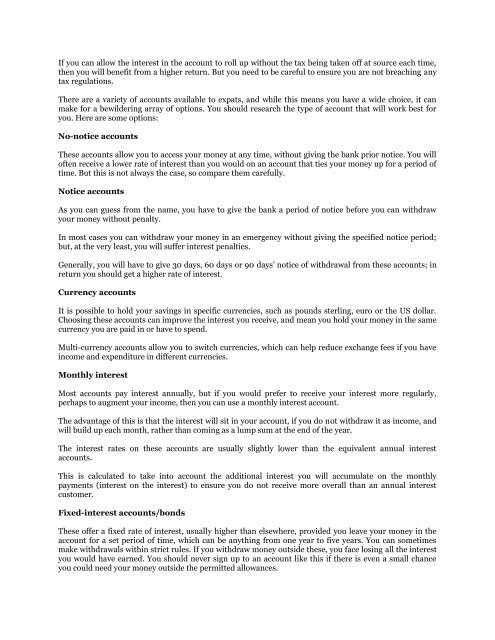Expat guide: Offshore deposits by Bowman Offshore Bank Transfers
We all work hard for our money, whether we are living and working in the UK, or overseas as an expat.
We all work hard for our money, whether we are living and working in the UK, or overseas as an expat.
Create successful ePaper yourself
Turn your PDF publications into a flip-book with our unique Google optimized e-Paper software.
If you can allow the interest in the account to roll up without the tax being taken off at source each time,<br />
then you will benefit from a higher return. But you need to be careful to ensure you are not breaching any<br />
tax regulations.<br />
There are a variety of accounts available to expats, and while this means you have a wide choice, it can<br />
make for a bewildering array of options. You should research the type of account that will work best for<br />
you. Here are some options:<br />
No-notice accounts<br />
These accounts allow you to access your money at any time, without giving the bank prior notice. You will<br />
often receive a lower rate of interest than you would on an account that ties your money up for a period of<br />
time. But this is not always the case, so compare them carefully.<br />
Notice accounts<br />
As you can guess from the name, you have to give the bank a period of notice before you can withdraw<br />
your money without penalty.<br />
In most cases you can withdraw your money in an emergency without giving the specified notice period;<br />
but, at the very least, you will suffer interest penalties.<br />
Generally, you will have to give 30 days, 60 days or 90 days’ notice of withdrawal from these accounts; in<br />
return you should get a higher rate of interest.<br />
Currency accounts<br />
It is possible to hold your savings in specific currencies, such as pounds sterling, euro or the US dollar.<br />
Choosing these accounts can improve the interest you receive, and mean you hold your money in the same<br />
currency you are paid in or have to spend.<br />
Multi-currency accounts allow you to switch currencies, which can help reduce exchange fees if you have<br />
income and expenditure in different currencies.<br />
Monthly interest<br />
Most accounts pay interest annually, but if you would prefer to receive your interest more regularly,<br />
perhaps to augment your income, then you can use a monthly interest account.<br />
The advantage of this is that the interest will sit in your account, if you do not withdraw it as income, and<br />
will build up each month, rather than coming as a lump sum at the end of the year.<br />
The interest rates on these accounts are usually slightly lower than the equivalent annual interest<br />
accounts.<br />
This is calculated to take into account the additional interest you will accumulate on the monthly<br />
payments (interest on the interest) to ensure you do not receive more overall than an annual interest<br />
customer.<br />
Fixed-interest accounts/bonds<br />
These offer a fixed rate of interest, usually higher than elsewhere, provided you leave your money in the<br />
account for a set period of time, which can be anything from one year to five years. You can sometimes<br />
make withdrawals within strict rules. If you withdraw money outside these, you face losing all the interest<br />
you would have earned. You should never sign up to an account like this if there is even a small chance<br />
you could need your money outside the permitted allowances.


